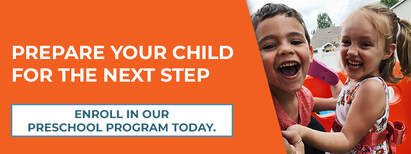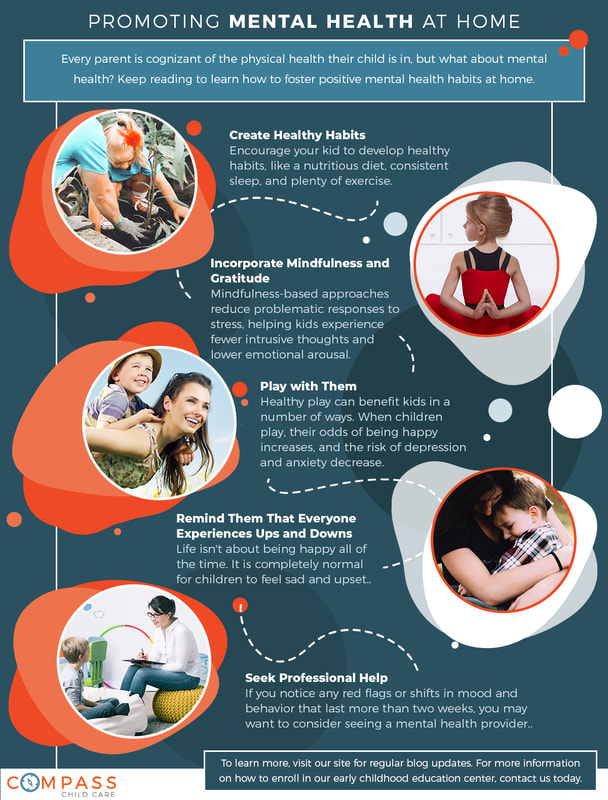|
If you are like most parents, you are pobably very diligent about taking care of your child, whether you are taking them to doctor’s visits, helping them clean a scrape on their knee, giving them nutritious food for dinner, and helping them with their schoolwork. How often do you consider their mental health, though? A child’s mental health is just as important as their physical health, especially when it comes to dealing with stress, behavior, and academics. Life is hard, and while they may not have the same exposure to life’s difficulties and complexities, children are still affected by external factors. The Center for Disease Control estimates that 1 in 5 children experience a mental disorder any given year. While not all mental health issues can be prevented, you can take steps to help keep your child as mentally healthy and possible. Keep reading to find out more, and if you are looking up “early childhood education center near me”, you will find that we have convenient locations in East Bethel, Isanti, Blaine, and Coon Rapids. Take Care Of Your Own Mental Health One of the most important ways that kids learn is through example. So, it goes to say that if your children see you take care of your own mental health, they too will learn how to maintain good mental health. Modeling good mental health habits also creates a healthier environment for your kid, so they know that it is not only OK to talk about their mental health, but to actively partake in habits that positively maintain it. It might go without saying, but taking care of your own mental health is especially important given all of the uncertainty around COVID-19 and many other difficult circumstances. Kids look to their parents to know how to deal with stressful and anxiety-provoking situations, so make sure you not only address any mental health issues, but make sure you take time to relax and de-stress. When parents have untreated mental health issues, children are more likely to develop mental health problems of their own. Untreated mental illness may also make family life inconsistent or unpredictable, affecting your ability to discipline your kids while also straining your relationship with your partner or other family members. This can take a toll on your child’s psychological well-being, and put them at a greater risk of developing mental illness themselves. Research shows that when a parent receives therapy or medication to address mental illness, children’s mental health symptoms also improve. Show Kids That The Ups And Downs Are Normal Everyone will experience times of strength and happiness as well of times of hardship and struggle. Life isn’t about being happy all of the time, as a matter of fact, this is an unrealistic perspective on life, and could potentially be harmful for your child. There is no shame in feeling sad or feeling like they are struggling with their emotions because it is a normal part of life. Showing children that yes, what they feel is normal, and that they are allowed to feel certain ways can be hugely powerful in helping them gain an understanding of their mental health. The Way Kids Think Is Very Important From a young age, children get constant messages that they may not be good enough. This can come from other kids making fun of how they dress or it could be from a teacher telling them that they didn’t do well on a homework assignment. These negative messages stick with kids, and they repeat them over and over in their thoughts. Negative thinking of the self, others, and the world could lead to future mental health struggles. It is crucial to pay attention to the comments kids make about themselves and others. If your child is constantly saying negative things, it could mean they need some extra support to problem-solve and change that type of thinking. Practicing negative self-talk is something that we all practice, even though we know we shouldn’t. It leads to lower self-esteem, which contributes to feeling vulnerable and not good enough. Our brain works best by repetition, so by rehearsing painful or mean thoughts, we create negative thinking patterns and it becomes harder and harder to escape from that. It is vital that we change negative thinking patterns, and this can be done by catching ourselves in the act, actively taking the power of that thought, and replacing it with a new one. While you can’t read your child’s mind, you can help them by asking them to elaborate on a negative thought that they say out loud and helping them replace it with a positive thought. It is a slow process, but one that has remarkable benefits.  Teach Your Child The Language Of Feelings One of the most important things that you can teach your children is to recognize what they are feeling and how to express their feelings into words. Children are known to be very emotional, but it’s mostly because they don’t know how to accurately express or even identify how they feel. Help your children grow by teaching them the many words for different emotions, and using examples when those feelings arise in themselves and others. Along with this, teach them that there is no “bad” emotion, not even anger or sadness. Sometimes the actions people take in response to those feelings are bad, but the feelings are never bad themselves. Feelings are powerful, and if we harness ourselves and our children with the tools to understand and listen to them, then we know how to move forward in a productive and appropriate way. Children who are taught that all feelings except for the happy ones are shameful and negative tend to shut down. They feel as if they cannot explore what they feel or even express it to an adult. Emotional language helps children develop essential emotional skills that help them deal with what they are feeling, as well as have stronger relationships. Develop Self-Esteem Helping children develop their self-esteem can have significant impacts on their mental health. It is important to not only boost your child’s self-esteem, but to teach them how to develop it themselves. From the parent side, this can be done by providing genuine and realistic praise. Try to avoid giving them unrealistic praise like, “You’re the smartest kid in school,” and instead praise their effort on a test or a homework assignment. Exaggerated compliments will only make them feel like they have to live up to exaggerated expectations. Another way to foster self-esteem is to give them opportunities for independence. Kids often feel better about themselves when they are able to do things on their own. Whether you are teaching your kid how to make a grilled cheese or are letting them complete an age-appropriate task, they build self-confidence and feel good about themselves, especially when they demonstrate competence. Watch For Red Flags, And Seek Help If Needed Your child may not be the most confident in their class, some kids may be naturally a little conscious, which is completely fine. But if you begin to notice your child feels overly sad and anxious about normal situations, there could be a problem. A change in mood or behavior that lasts more than two weeks could be something worth looking into. Be on the lookout for issues with concentrating or the inability to sit still. While these issues may subside, it is never a bad idea to seek out professional help. It may seem like a drastic decision, because c’mon, they’re just a kid, but it is never too early for children to see a mental health provider. Counseling can help improve your child’s mental health, but it can also give you an insight into what they are feeling. We know this isn’t an easy topic to talk about, but it should be. Your child’s mental health is just as important as yours, and especially during such a volatile time in the world, mental health is one of the key ways we can take care of ourselves. Stay updated on our blogs for news and information about early childhood education. For more information about our programs, or to learn how to enroll, contact our office today. |
AuthorWrite something about yourself. No need to be fancy, just an overview. ArchivesCategories
All
|



 RSS Feed
RSS Feed
